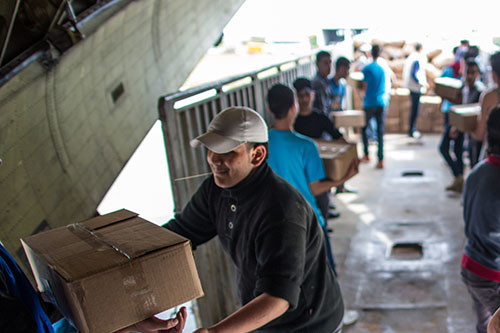Diploma in Humanitarian and Development Studies
Humanitarian disasters will continue to occur around the world, and there is a continuous need for skilled humanitarian workers. In addressing humanitarian crises, the international community has long understood the need to extend beyond providing immediate relief, and to engage with long-term recovery activities and the prevention of similar crises in the future. However, this continuum from short-term relief to rehabilitation and development has often proved difficult to achieve. This course aims to shed light on the continuum of humanitarian crisis management, particularly from the viewpoint of major bilateral donors and agencies. Focusing on cases of armed conflicts and disasters, the course describes the evolution of approaches and lessons learnt in practice when moving from emergency relief to recovery and prevention of future crises.
The programme responds to the need for qualified workers in disaster relief and development, in government and non-government agencies involved in humanitarian operations and development practice; addressing challenges and opportunities associated with various forms of national and international migration; public health programming, preparedness and response; and building the resilience of vulnerable populations. The purpose of the programme is for the practical application of specialized theoretical knowledge in humanitarian and development contexts.
Objectives of the course
- To provide humanitarian workers with the awareness, understanding and skills essential for effective action as individuals and as members of a team.
- To identify and promote standards of good practice in humanitarian responses
- To examine strategies for early warning and prevention of humanitarian crises.
- To encourage cooperation and dialogue between governmental, non-governmental, national and international agencies involved in humanitarian action.
- To create a more effective synergy between emergency humanitarian interventions and programmes promoting sustainable development.
Modules
- Public Health in Complex Emergencies (Advanced)
- Public Health and Communicable Disease Control;
- Food and Nutrition;
- Reproductive Health; HIV/AIDS;
- Sexual violence; Torture;
- Mental Health.
- Emergency and Disaster Management
- Risk Assessment and Vulnerability Analysis
- Disaster Preparedness and Response
- Recovery, Rehabilitation and Reconstruction
- Reporting, Information and Documentation in Disasters
- The Humanitarian Arena
- Political, Social and Economic context
- Complex Humanitarian Emergencies, Fragile States
- Natural Disasters, Global Climate Change
- International Humanitarian Law (IHL) and Human Rights
- Humanitarian Ethics and Codes of Conduct
- The role of the Media
- Process towards stability and sustainable development
- The role of the military in humanitarian interventions
- Peacekeeping, peace-building and peace-making
- Repatriation and reintegration; Tracing
- Post conflict rehabilitation and demobilization; Child Soldiers
- Managing the transition to sustainable development
- Economic stabilization and sustainable livelihoods
- Exit strategies in humanitarian assistance programmes
Who should enroll?
This is a diploma suitable for persons working in or planning to enter the humanitarian sector, including staff of humanitarian aid organizations, governments, and UN agencies. There are no prerequisites for this course. All participants are expected to have theoretical knowledge of humanitarianism, although humanitarian aid experience is not presumed
Training Format:
- All materials are made available through our Online Learning Platform
- Students should commit approximately 5-6 hours of their time per week
Materials Provided:
Online delivery of curriculum materials, exercises and templates.
Assignments:
In order to demonstrate their understanding of the course content, students will be required to submit assignments at the end of every month.
Duration of course – 6 months
Learning Plan
- Access to course materials on E-Learning Platform
- Online interaction with Course Moderators
- Monthly assignments
- 15-20 Page Project Paper
- End of Course Examination
- Certification
Cost: Amount €1000 per Person




